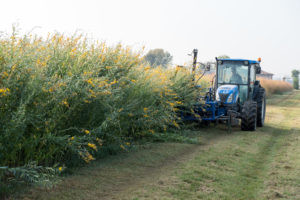BECOOL project achieved first results consisting in testing sunn hemp/wheat agricultural rotation in Spain, in validating no-tillage as the best technique to enhance sunn hemp productivity and in recovering maize cobs thanks to an innovative mechanized harvester system.
BECOOL is validating a strategy to develop both energy and food/feed crops by increasing land exploitation without degrading soil quality and influencing food/feed demand in European Union.

For this reason, one of the energy crops-food/feed crops rotation strategy has been tested in Spain, in the municipality of Guadajira (Extremadura). CIEMAT conducted a trial consisting in alternating wheat as food crop with sunn hemp (Crotalaria juncea L.), a fast-growing and high-yielding legume that can be grown as fibre crop or energy crop in Europe, despite its tropical origin. The test provided promising results concerning productivity, soil and biomass characterization as well as yield and energy balance.
Previously, in the summer of 2017 researchers of the University of Bologna Department of Agricultural Science had carried out a study at Cadriano farm, Bologna (Italy). They had compared three soil management practices applied to sunn hemp: no-tillage (NT), minimum-tillage (MT) and conventional tillage (CT). The no-tillage treatment had resulted as the best technique in terms of crop yield and economic due to the lower costs for soil preparation, with subsequent time savings, as well as better agronomic results.
Additionally, BECOOL is focusing on increasing the efficiency of recovery of lignocellulosic biomass from the unused residues of traditional crops, such as tree prunings, chaff and maize cob.
Maize cobs are untapped resources being rarely used and generally left uncollected on the ground. Instead, they represent a potential feedstock for energy or for bio-based products. In September 2017 CREA (Consiglio per la Ricerca in Agricoltura e l’Analisi dell’Economia Agraria) conducted trials to assess the performance of an innovative mechanized system to collect this kind of residues. A harvester machine equipped with the innovative Harcob system demonstrated the possibility of harvetsing tonnes of cob by separating cobs from grain in a fast, efficient and cost-effective manner. Final products resulted in a biomass resource perfect to be fed directly into an anaerobic digester or dried for animal bedding.
Visit BECOOL website for further information on sunn hemp/wheat rotation in Guadajira, on no-tillage technique performance, on the recovery of maize cobs as valuable feedstock.


